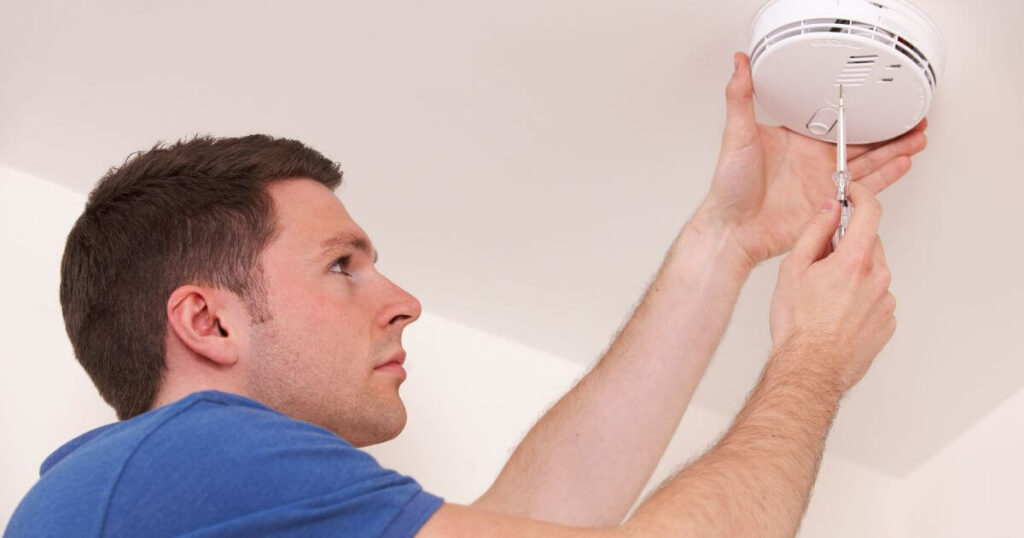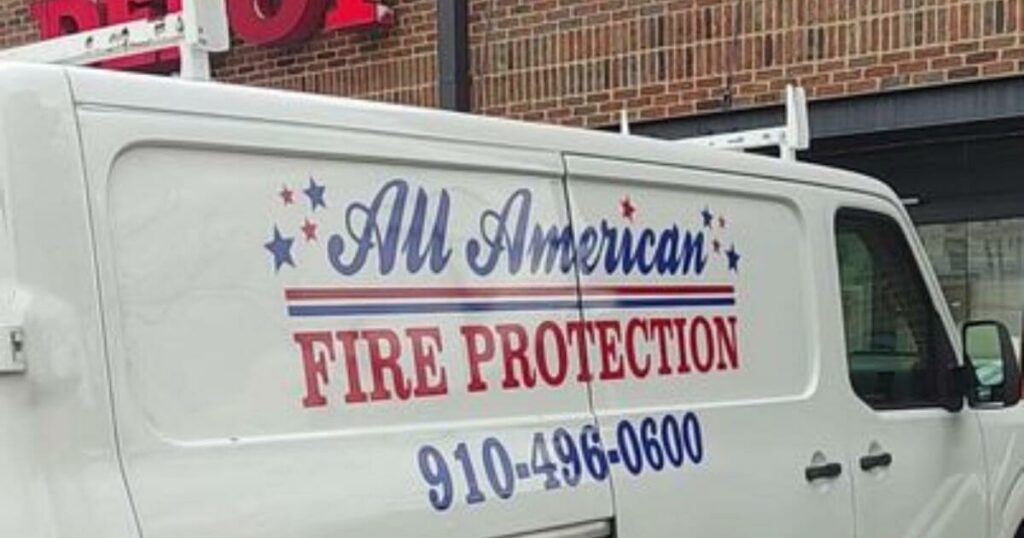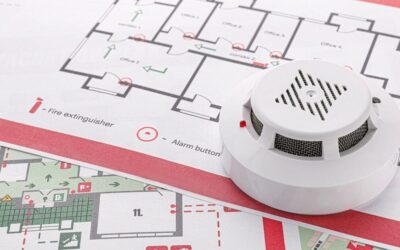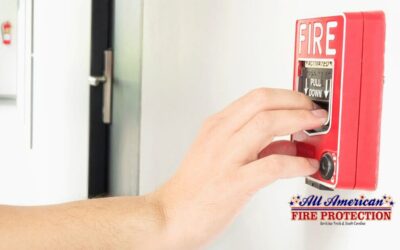As a property owner or manager, ensuring the safety of your building and its occupants is a top priority. One of the most critical components of your fire protection strategy is a properly functioning smoke detector system. Smoke detectors provide early warning of a fire, allowing occupants to evacuate quickly and safely while minimizing property damage.
At All American Fire Protection, we understand the importance of comprehensive smoke detector services. Our team of certified technicians is dedicated to providing expert installation, maintenance, testing, and repair services to ensure that your smoke detectors are always ready to protect your property and its occupants.
Types of Smoke Detectors
There are several types of smoke detectors available, each with its own unique features and benefits. Understanding the differences between these types can help you choose the best smoke detectors for your specific needs.
Ionization Smoke Detectors
Ionization smoke detectors are the most common type of smoke detector. They work by using a small amount of radioactive material to ionize the air between two electrically charged plates. When smoke enters the chamber, it disrupts the ionization process, triggering the alarm.
Benefits of ionization smoke detectors:
- Highly sensitive to small smoke particles
- Ideal for detecting fast-flaming fires
- Generally less expensive than other types of smoke detectors
Photoelectric Smoke Detectors
Photoelectric smoke detectors use a light source and a light-sensitive sensor to detect smoke. When smoke enters the chamber, it scatters the light, triggering the alarm.
Benefits of photoelectric smoke detectors:
- More effective at detecting smoldering fires
- Less prone to false alarms caused by cooking or steam
- Ideal for areas near kitchens or bathrooms
Combination Smoke Detectors
Combination smoke detectors, also known as dual-sensor smoke detectors, use both ionization and photoelectric technologies to provide comprehensive protection against both fast-flaming and smoldering fires.
Benefits of combination smoke detectors:
- Offer the advantages of both ionization and photoelectric detectors
- Provide the highest level of protection for most applications
- Ideal for general use throughout a building
Aspirating Smoke Detectors (ASD)
Aspirating smoke detectors, also known as air sampling smoke detectors, use a network of pipes to continuously sample the air in a protected area. The air is drawn into a central detection unit, where it is analyzed for the presence of smoke particles.
Benefits of aspirating smoke detectors:
- Extremely sensitive and can detect smoke at the earliest stages of a fire
- Ideal for mission-critical environments, such as data centers and server rooms
- Can cover large, open areas or hard-to-reach spaces

Smoke Detector Installation Services
Proper installation is crucial to ensuring that your smoke detectors function effectively and reliably. Our experienced technicians follow industry best practices and manufacturer guidelines to ensure that your smoke detectors are installed correctly and strategically placed for optimal coverage.
When installing smoke detectors, several factors must be considered, including:
- Building layout and size
- Type of occupancy (residential, commercial, industrial)
- Local and national fire codes and regulations
- Environmental factors (temperature, humidity, airflow)
- Presence of potential false alarm sources (kitchens, bathrooms, etc.)
Our installation process involves a thorough assessment of your property to determine the best locations for your smoke detectors. We then carefully install and configure each device, ensuring proper connections and communication with your fire alarm control panel.
Benefits of professional smoke detector installation:
- Ensures compliance with local and national fire codes
- Optimal device placement for early detection and reduced false alarms
- Proper integration with your fire alarm system
- Peace of mind knowing your smoke detectors are installed correctly
Smoke Detector Maintenance and Testing
Regular maintenance and testing are essential to ensuring that your smoke detectors remain in proper working order. The National Fire Protection Association (NFPA) has established guidelines for the inspection, testing, and maintenance of smoke detectors, as outlined in NFPA 72.
According to NFPA 72, smoke detectors should be inspected and tested at the following intervals:
| Component | Inspection Frequency | Testing Frequency |
| Smoke detectors (in-place) | Semi-annually | Annually |
| Smoke detectors (laboratory) | N/A | Every 5 years |
| Batteries (replaceable) | Monthly | Annually |
| Batteries (non-replaceable) | Monthly | Annually |
During a maintenance visit, our certified technicians will perform a comprehensive inspection of your smoke detectors, checking for any signs of damage, contamination, or reduced sensitivity. We will also test each device to ensure it is communicating properly with your fire alarm control panel and initiating the appropriate alarm response.
Benefits of regular smoke detector maintenance and testing:
- Early identification and correction of potential issues
- Prolonged device lifespan
- Reduced risk of false alarms
- Compliance with NFPA standards and local fire codes
- Peace of mind knowing your smoke detectors are always ready to protect your property and occupants
Smoke Detector Repair Services
Despite regular maintenance and testing, smoke detectors may occasionally experience issues that require repair. Some common problems that may necessitate smoke detector repair include:
- Physical damage to the device
- Reduced sensitivity due to dirt, dust, or other contaminants
- Wiring or connection issues
- Compatibility problems with the fire alarm control panel
- Malfunctioning internal components
Our skilled technicians are trained to diagnose and repair a wide range of smoke detector issues. We use advanced troubleshooting techniques and state-of-the-art tools to identify the root cause of the problem quickly and accurately. Once the issue is identified, we will provide you with a detailed report of our findings and recommendations for repair or replacement.
In some cases, it may be more cost-effective to replace a faulty smoke detector rather than repair it. Factors that may influence this decision include the age of the device, the extent of the damage, and the availability of replacement parts. Our technicians will help you weigh the pros and cons of repair versus replacement, ensuring that you make an informed decision that prioritizes safety and cost-effectiveness.
Advanced Smoke Detection Systems
In addition to traditional smoke detectors, there are advanced smoke detection systems available that provide even earlier warning and more precise detection capabilities.
VESDA (Very Early Smoke Detection Apparatus)
VESDA systems use a network of air sampling pipes to continuously draw air from the protected area into a central detection unit. The air is then analyzed using highly sensitive laser technology to detect the presence of smoke particles at the earliest stages of a fire.
Benefits of VESDA systems:
- Provide the earliest possible warning of a developing fire
- Ideal for mission-critical environments, such as data centers, clean rooms, and cultural heritage sites
- Can be customized to meet specific detection requirements
- Highly resistant to false alarms
OSID (Open-Area Smoke Imaging Detection)
OSID systems use advanced imaging technology to detect smoke in large, open areas where traditional point-type smoke detectors may be less effective. The system consists of a camera-like device (imager) and an emitter that sends both infrared and ultraviolet light signals. When smoke enters the path between the emitter and imager, the system analyzes the signal strengths to determine the presence and density of smoke.
Benefits of OSID systems:
- Provide reliable smoke detection in large, open spaces
- Resistant to false alarms caused by dust, steam, or other non-smoke sources
- Easy to install and maintain
- Cost-effective solution for protecting expansive areas

Why Choose All American Fire Protection
When it comes to protecting your property and its occupants from the dangers of fire, you need a partner you can trust. At All American Fire Protection, we have been providing comprehensive fire protection services, including smoke detector services, for over 30 years.
Here are just a few reasons why our customers choose us for their smoke detector needs:
- Experienced and certified technicians: Our team consists of highly skilled professionals who hold relevant industry certifications, such as NICET (National Institute for Certification in Engineering Technologies). They have the knowledge and expertise to handle all your smoke detector needs, from installation to maintenance and repair.
- Comprehensive services: We offer a full range of smoke detector services, including installation, maintenance, testing, repair, and replacement. No matter what your needs are, we have you covered.
- 24/7 emergency support: Fire emergencies can happen at any time, day or night. That’s why we offer 24/7 emergency support to our customers. If you experience a problem with your smoke detectors outside of regular business hours, our technicians will be there to help.
- Commitment to customer satisfaction: At All American Fire Protection, we are dedicated to providing exceptional customer service. We take the time to understand your unique needs and work closely with you to develop a customized solution that meets your requirements and budget.
FAQ Section
- How often should smoke detectors be replaced? Smoke detectors should be replaced every 10 years, or sooner if they become damaged, malfunction, or fail a sensitivity test. It’s important to check the manufacturer’s recommendations for your specific devices, as some models may have a shorter lifespan.
- How many smoke detectors do I need in my building? The number of smoke detectors required in your building depends on several factors, including the size and layout of the space, the type of occupancy, and local fire codes. As a general rule, smoke detectors should be installed in every room, hallway, and level of your building. Our technicians can assess your property and provide specific recommendations based on your unique needs.
- Can smoke detectors detect carbon monoxide? No, standard smoke detectors cannot detect carbon monoxide. Carbon monoxide is a colorless, odorless gas that requires a specialized detector. However, many manufacturers offer combination smoke and carbon monoxide detectors that provide protection against both hazards.
- What causes smoke detectors to become too sensitive? Smoke detectors can become overly sensitive due to a buildup of dust, dirt, or other contaminants on the sensing chamber. This can cause false alarms or reduced detection capabilities. Regular cleaning and maintenance can help prevent this issue.
- How do I know if my smoke detector is working properly? Most smoke detectors have a test button that allows you to verify the device’s functionality. When pressed, the button should trigger the alarm sound. However, this test does not assess the detector’s sensitivity to smoke. Professional testing and maintenance by a certified technician is the best way to ensure your smoke detectors are working properly.



